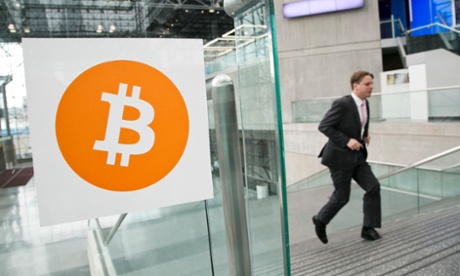Institute
of Economic Affairs says governments should allow competition on a
level playing field between all alternative forms of money.
 |
|
A man enters a bitcoin conference in New York. Photograph: Mark Lennihan/AP |
(
TheGuardian) UK should privatise the pound and replace it with a
cryptocurrency like bitcoin, according to a paper published Wednesday by
the free-market Institute of Economic Affairs.
Kevin Dowd, a
professor of finance and economics at Durham University, says that
although bitcoin isn’t the first example of private money, it is the
first that governments can’t shut down. Therefore, he says, authorities
should admit that it’s here to stay, and allow competition on a level
playing field between all alternative forms of money.
That might
include allowing taxes to be payed in cryptocurrencies such as
bitcoin
and
dogecoin, or even fully privatising the pound, selling off the right
to mint the currency to the highest bidder.
“Let’s suppose that
bitcoin became a very prominent currency,” Dowd told the Guardian. “[To
ensure a level playing field], the government itself would accept
bitcoin in tax payments. So, in effect, the government should not be
favouring its own currency, or any particular currency, through any of
its unique powers. Nor have regulations against them.
“The natural
analogy is with some of the old, bad, monopolies like British Gas or
British Telecom. Telecom is a very good example: for a long time, we had
a government monopoly, which stifled innovation, and the service was
poor. Once that got opened up, competition opened, new innovation
prospered, and we got all sorts of innovation that we couldn’t possibly
anticipate, and we’re a lot better off for it.”
Dowd places
bitcoin at the pinnacle of a historical trend of government crackdowns
on attempts to create private money. The Liberty Dollar, a physical,
gold-based private mint, and e-gold, a digital, gold-based e-currency,
both ended up with their creators and proprietors in court, the former
on charges of counterfeiting, and the latter over allegations of money
laundering.
But Dowd argues the charges were
politically-motivated protectionism. “Counterfeit 101 is that you try
make the fake look like the real thing,” he says, “and the whole
business model was predicated on saying that [the Liberty Dollar] is
superior to US currency.”
Because Bitcoin is decentralised, it’s
significantly harder to crack down on using the courts – “you could shut
the whole web down, but they can’t do that,” Dowd adds – and so
governments can’t stop its rise. If it does become popular, they will
have to deal with it some other way.
There’s a lot standing in the
way of cryptocurrencies before they reach that success, however. For
one thing, Dowd writes, “to displace existing state currency they not
only have to perform the basic functions of money at least as well as
state money, they probably also need qualities that transcend the way in
which state money works.”
For some advocates of bitcoin, as well
as for Dowd himself, those qualities come in the form of protection
from inflation: the cryptocurrency will only ever have 21m coins
created, ensuring that it will always “hold its value” (though also,
critics claim, rendering the bitcoin economy prone to deflationary
slumps).
For others, they come from the purely digital nature of the currency. Venture capitalist Marc Andreessen
describes it
as the financial equivalent of the internet, saying “The internet was a
new way to transmit data. Bitcoin’s a new way to transmit money. It’s
going to take a long time. The good news it’s a big opportunity. Money
is a very big deal, and so if you can build a new way to deal with
money, it’s very important and valuable. It just takes time.”
Open your free digital wallet here to store your cryptocurrencies in a safe place.

